Update: North Korean leader Kim Jong Un invited South Korean President Moon Jae-in to Pyongyang “at an early date.” President Moon has responded that the two countries should create the circumstances to allow such a meeting to take place. It is good to see the two Koreas moving forward in spite of US efforts to divide them.
The Politico article cited below has been updated to include the White House response to criticism of Vice President Pence’s behavior at the Olympics. The White House spin, which does not pass the straight face test as it is inconsistent with what occurred, is that the lack of communication between Pence and the North Koreans was mutual. It was only Pence who arrived late at the diplomatic dinner and did not stay for more than five minutes. Kim stayed for the entire dinner. It was only Pence who shook all hands in the room except for Kim Yong Nam. It is good news that the White House felt it had to do something to correct the perception that the vice president behaved poorly in his lack of interaction with the North Koreans. The White House noticed that the world noticed Pence’s lack of diplomatic behavior.
Pence’s poorly handled visit to South Korea may inadvertantly help progress for peace in the Koreas. The US showed by Pence’s boorish and childish behavior that it is not mature enough to be part of resolving the conflict in Korea. The Pence behavior gives Moon further flexibility in pursuing his own path to postive relations with North Korea. The North Korean and South Korean presidents pursuing a face-to-face meeting makes it more difficult for the US to proceed with its “bloody nose” strategy. It makes it more difficult for the US attack North Korea when the two countries are in peace talks. If the US is further sidelined as a result of Pence’s behavior toward North Korea at the Olympics it is a good thing as the US prevents progress. Pence may have helped make the United States less relevant.
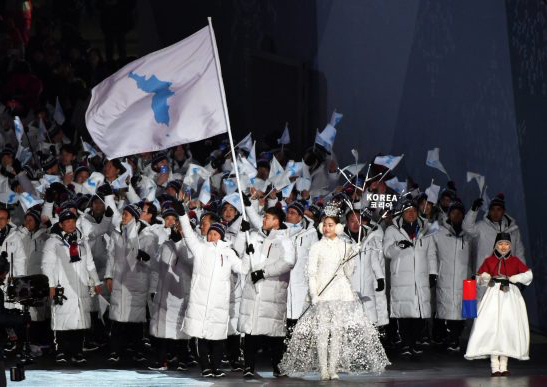
The unified Korean team marches in the opening ceremony of the Winter Olympics at Pyeongchang Olympic Stadium. Credit James Hill for The New York Times
President Moon Jae-in said at a carefully planned dinner to honor Kim Yong Nam, the North Korean president’s sister, and Vice President Mike Pence that he hoped the Winter Olympics would be remembered as the “day peace began.” But Vice President Pence did his best to make sure that did not happen, missing the opportunity to further peace on the peninsula created by Moon. Dismissing the historic opening created by North and South Korea, Pence handled the situation instead like a childish teenager.
At a dinner reception where President Moon sought an opportunity for dialogue between U.S. officals and North Koreans, Pence went through great – and somewhat awkward – lengths to avoid talking to them. According to Reuters, when Pence arrived late to the reception he told Moon he planned to leave directly after a photo session but Moon asked him to “come and say hello to friends.” Moon was trying to create a dialogue to advance peace but Pence went around the table and shook hands with everyone except Kim Yong Nam of North Korea.
“There are some who would not want to be in the same room together if it wasn’t for the Pyeongchang Winter Olympics,” Moon said. “But what is more important than anything is that we are together.” Politico described it as a close call for Pence: “Vice President Mike Pence’s Olympic visit to Pyeongchang, South Korea, began Friday with a close call with the North Korean officials, whom the vice president appeared to avoid at a diplomatic reception before the opening ceremonies.”
Since Pence arrived at the dinner late the seating plan was shuffled, Pence again missing an opportunity created by Moon. Originally, the seating plan showed Pence, with his wife to the left and Moon to his right, seated across the round table from Kim, who was nestled between UN Secretary General António Guterres and International Olympics Committee President Thomas Bach’s wife.
Kim’s visit is significant as she is the first member of North Korea’s ruling family to enter South Korea since the end of the Korean War in 1953. Who knows what kind of conversation could have occurred that might have furthered the prospects for peace, but Pence avoided the opportunity.
Pence left the event after five minutes. Reuters reports that he skipped the symbolic desert called “A Plate of Hope,” a “dark chocolate tempered in the shape of barbed wire lay over a map of the Korean peninsula rendered in thin blue chocolate, a representation of the heavily militarized border that separates Games host South Korea and its old enemy in the North.”
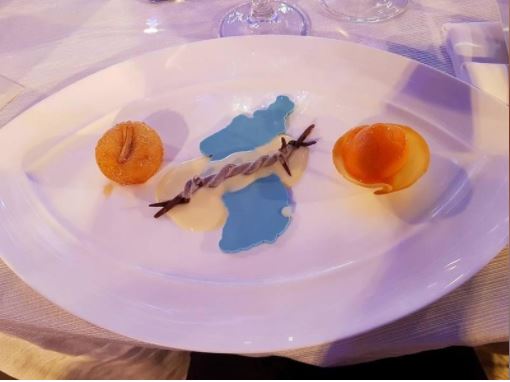
The Moon administration’s diplomatic response to Pence’s behavior was muted. “A source in the Moon administration said Pence’s absence at the reception was a ‘mere bump’ in an otherwise successful diplomatic event,” Reuters reported.
At the stadium Pence sat one row in front of the North Koreans, but even with Kim Jong Yo just behind him, he never even turned around to exchange pleasantries – Pence had “no interaction” with her, according to press reports. New York Magazine described it as Pence “avoiding eye contact” with the Korean leader. Another missed opportunity for dialogue.
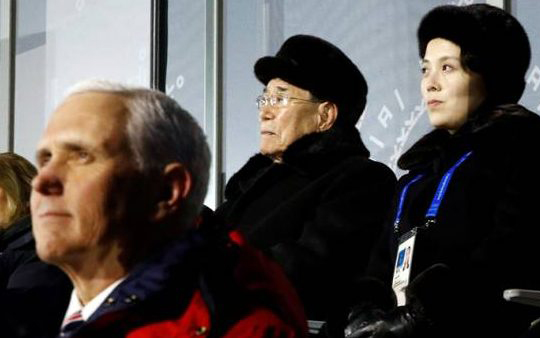
Vice President Pence, so close and yet so far from North Korea’s Kim Jong Yo. The two never even made eye contact
At the same moment, South Korean President Moon Jae-in shook hands with Kim Yo Jong, creating a historic moment and a photograph that gave hopes to many for peace between North and South Korea and movement toward unification and an end of hostilities.
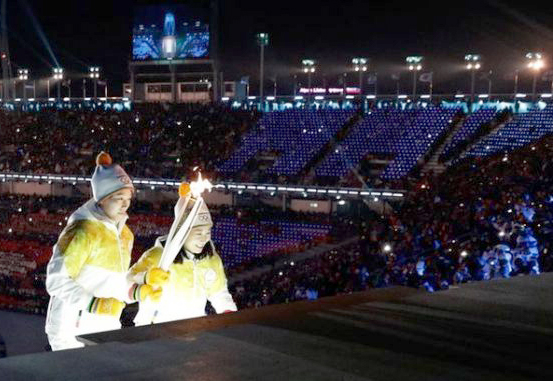
Another show of unity was when two members of the Unified Korean Hockey Team, one from the north and one from the south, carried the Olympic torch up the final flight of stairs in the opening ceremonies. They handed the torch over to figure skater Yuna Kim, a South Korean who won the gold medal in 2010 and the silver medal in 2014 who lit the Olympic cauldron.
Of course, it is easy to overestimate the importance of these images of North and South Koreans shaking hands and being friendly toward each other, as well as of South and North Korean athletes walking into the Olympic stadium together. The displays of unity are largely symbolic and on political level may not ultimately lead to a diplomatic breakthrough or ensure peace on the Korean peninsula. It is a long hard road to peace and much needs to be negotiated.
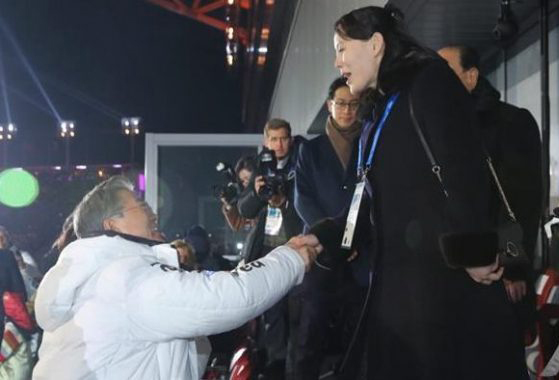
While Pence was present, South Korean President Moon Jae-in shook hands with Kim Yo Jong, creating a historic moment and a photograph that gave hopes to many for peace between North and South Korea and movement toward unification and an end of hostilities
But considering the high level of tensions on the peninsula, the trading of insults that has taken place between President Donald Trump and Kim Jong-un, and the impasse over North Korea’s nuclear program, these gestures should be celebrated as glimmers of hope that could help us avoid the real possibility of all-out war.
Instead, the gestures were rejected by highest levels of the U.S. government. Dialogue was rejected and peace became a more distant prospect. This prospect is made even more difficult with the U.S. threatening to give North Korea a “bloody nose,” bully talk for a military first strike, against North Korea.
At the end of the day, Pence had exemplified the worst of arrogant U.S. foreign policy with his childish behavior.
Kevin Zeese co-directs Popular Resistance. This article first appeared as the weekly newsletter of the organization.


